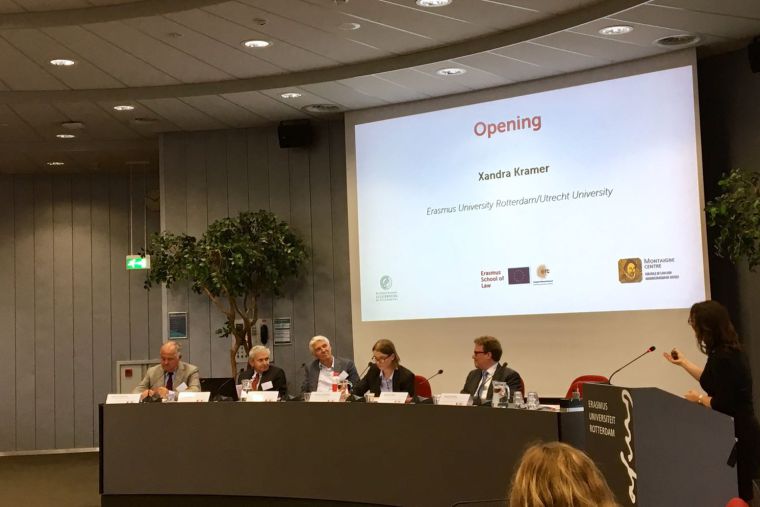P.R.I.M.E. Finance Attends “Innovating International Business Courts: A European Outlook”

P.R.I.M.E. Finance Foundation staff and interns attended “Innovating International Business Courts: A European Outlook” on July 10. At the seminar, leading practitioners from a cross-section of Europe shared their experiences working within domestic systems to establish English-language, specialized national courts for litigating international business and commercial disputes.
Participants included individuals from more than twenty countries, with a wide range of backgrounds including academics, practitioners, judges, lawyers, and policymakers. The discussion encapsulated progress and challenges in the Netherlands (Netherlands Commercial Court), the United Kingdom (Business and Property Courts), France, Germany (Chamber for International Commercial Matters), and Belgium (Brussels International Business Court, or "BIBC").
Broadly speaking, these specialized courts aim to address critical problems facing states and private sector entities engaged in commercial disputes. While the Netherlands and Belgium are still working to pass legislation creating their respective courts, each country described common goals that these courts would work to achieve: the need to provide a place where commercial disputes with an international aspect (often broadly defined) can be adjudicated in a common, international language, with more expediency and technical expertise than provided in traditional state courts, but potentially more perceived legitimacy, especially through its public nature, than current mechanisms. As one of the French practitioners described, judges in these courts may have real technical expertise that enables them to understand the life of the disputed contract - often with a better factual grasp than the lawyers. On the whole, the Courts are structured to support large entities with weighty cases who can afford greater fees associated the aforementioned benefits.
A primary theme of the event was adjusting to change. Change on account of globalization, change in the geopolitical makeup of the European Union, and change in technology are all part of what is driving the shift to create these new courts. This experiment is very much in the early stages. The market itself will be a primary driver in answering questions about the benefits of these courts over arbitration. In the wake of Brexit, such change and uncertainty has taken on an even more urgent dimension as business and legal experts struggle to ensure adjudicatory mechanisms with enforcement power continue to exist. One area in which this is particularly pronounced is in disputes arising from ISDA Master Agreement contracts. The proliferation of some of these new courts is in part a means to fill any gap left if and when London is unable to maintain its leading status in this community.
Judicial training will likely play a large role in the efficacy of these courts. The French panelists in particular spoke to the importance of technical expertise judges in these Courts should hold – depending on the Court, it may be possible that judges are selected with an eye towards linguistic and technical skills, and training programs on international business law and other similar topics could be established. The future Netherlands Court representative also made a special note regarding the training judges in those chambers would receive in order to be fully prepared to best handle the cases that come before it.
It remains to be seen the extent to which these national courts will work to complement one another, and how much healthy competition will arise. The divide between common law and civil law systems, and how contracts are interpreted differently under each, will likely also play a role in determining the preferences private sector entities have for one court over another.
A fundamental challenge shared by many of the Courts is to establish legitimate confidence by relevant entities in reliability of these new chambers in order to judge litigation. According to Sir Geoffrey Vos, Chancellor of the High court in London, part of this involves courts supporting business and commercial arbitration if the businesses so wish. An independent judiciary, he said, is "crucial" if business is to be persuaded to invest in a country.
As one panelist noted, the current moment in history marks a “new dawn” for international commercial litigation. P.R.I.M.E Finance looks forward to working with practitioners and experts around the globe as these new initiatives progress and complement existing arbitration efforts.
The seminar was jointly organized by Erasmus School of Law (ERC project Building EU Civil Justice') of Erasmus University Rotterdam, in collaboration with the Max Planck Institute for Procedural Law Luxembourg, and the Montaigne Centre for Rule of Law and Judicial Administration (Utrecht University). More information on the program, speakers, and future similar events can be found here.